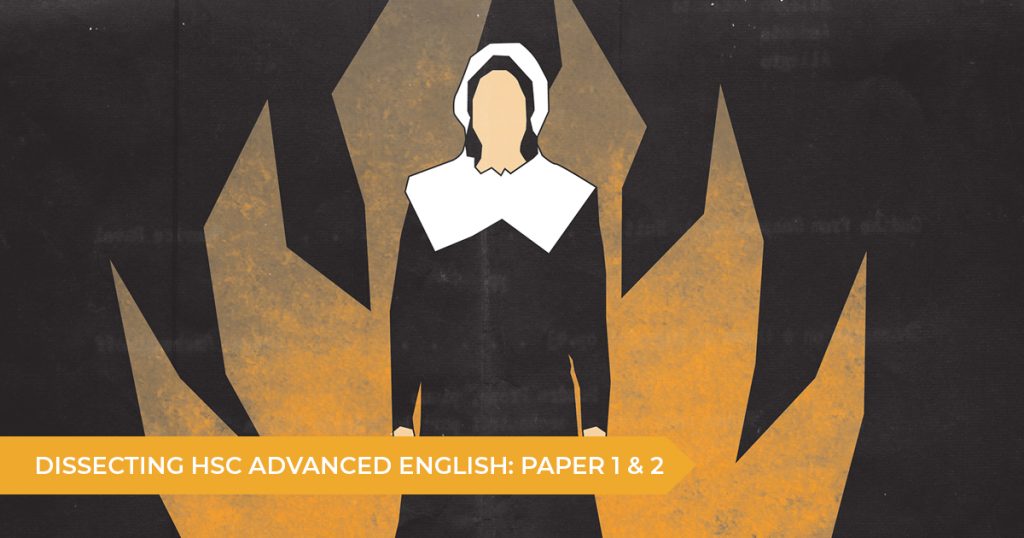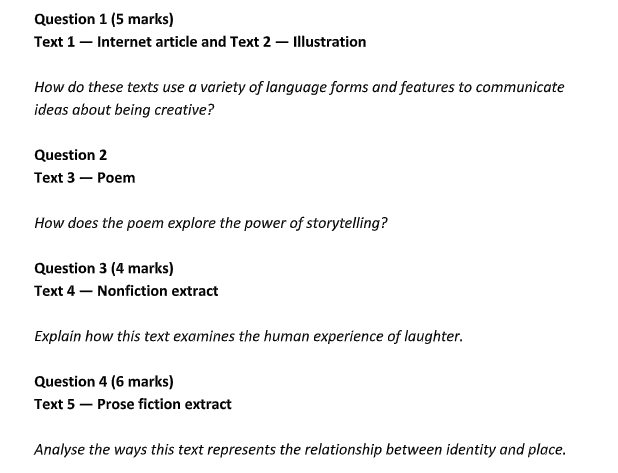HSC 2020: English Advanced Paper 1 & 2
To prepare for the upcoming school term, we will start by exploring the key differences between English Advanced Paper 1 and Paper 2 of the HSC exams, since many students will commence the Module A studies upon returning to school.
We will have a look at why HSC English requires students to sit for two separate exam papers, and how each module will be tested. The blog post will also briefly explain the difference between the short answer questions to the extended analytical responses.
Please note that this blog post was specifically written for English Advanced students, although English Standard students will also benefit from the below information.
Overview of Paper 1 and 2
In your first term as a Year 12 student, you would have most likely studied and completed the Common Module, also known as Texts and Human Experiences – this will be tested in the first paper.
RELATED: Texts & Human Experiences – How To Break Down the Common Module (HSC English)
In the subsequent months, you will be studying three more modules called Module A, B and C. These modules will be collectively tested in the second paper.
Consider the below table for a quick summary of differences between the two papers.
Short Answer Responses
Given that the English exams are always scheduled first in the HSC timetable every single year for the past decades, Paper 1 is likely to be the first HSC exam for the majority of students.
Accordingly, the short answers within Section I will be the first questions you will attempt in the HSC. Your ability to perform well in this section will determine whether or not you are able to set a positive start and tone for the remainder of your HSC exams.
Here are some basic rules of the section:
– There will be either four or five short answer questions
– Each question will be worth between 1 – 7 marks. Use this and the given dashed lines in the writing booklet as a guide to determine how much you should write.
– Each question will have different instructions such as identify, describe, analyse explain or compare.
– Each question will be linked to a specific unseen text and some questions will even ask for a comparative response which requires reference to two unseen texts. Carefully read the question to make sure you are using the right stimulus.
– The unseen texts can be visual texts, fiction or non-fiction texts, poetry, media articles, advertisements, posters or short excerpts from novels or plays. Students must be able to identify and analyse a range of techniques such as literary or poetic, under exam conditions to do well.
The unseen texts and questions will also draw references to the Human Experience rubric as individual or collective experiences, paradoxes or anomalies, and so. forth. Therefore, students must familiarise themselves with the module description in order successfully answer the question.
Now, let’s take a look at the following short answer questions from the latest 2020 HSC English Advanced Paper:
To prepare for this section, you will need to work on developing your ability to locate the relevant ideas in the unseen texts and extracts and identify the features of language – the techniques and examples – that led to this understanding.
Extended Analytical Responses
Moving on, based on the above table, it is clear to see that you will compose three extended analytical responses – most likely in an essay format – across the two papers, specifically in Section II of Paper 1 and Section I and II (Module A and B) of Paper 2. Evidently, the ability to write a good essay is essential in maximising your performance in the HSC English exams.
When composing this analytical response, it will always require you to link back to your respective prescribed text(s) of the corresponding module. However, the essay question may be generic (meaning it will be one common question to all of the prescribed texts within the module) or they may be specific to the prescribed text(s). The latter is, of course, harder.
Let us have a look at the different styles of essay questions you may get asked:
– Argument questions
– ‘To what extent’ questions
– Form questions
– Language technique questions
– General statements and quotes questions
– Extracts questions
RELATED: How To Read And Understand Shakespeare In High School
Argument Questions
Questions like this require students to extensively demonstrate and explain the key nominated aspects and specific ideas of the prescribed text. They are often idea and value based – here are some examples:
– How does the examination of compassion and forgiveness in Arthur Miller’s ‘The Crucible’ depict both the positive and challenging aspects of human experience?
– Examine how two of Rosemary Dobson’s poems explore the search for hope and grace which is an important part of the human experience.
‘To What Extent’ Questions
These questions require students to make an assessment regarding the prescribed text(s) based on the given quotation or statement within the question. In the essay response, students need to decide whether the prescribed text(s) satisfies the question and to which varying degrees, such as to a limited extent or a significant extent. Students can also choose to nominate an alternative position and argue against the question. However, it is still important to demonstrate a certain level of engagement with the question before proceeding to the self-nominated argument.
Here are some examples:
– ‘Through exploring human experiences, stores encourage us to develop insights about the behaviour and motivations of others.’ To what extent has your prescribed text(s) presented to you with new and challenging insights?
– To what extent does George Orwell’s Nineteen Eighty-Four challenge audiences to reflect on the complexities and tensions of human experiences throughout time? In your response, make a detailed reference to the text.
Form Questions
This type of question asks students to explore specific aspects of the prescribed text(s)’s textual form. To successfully navigate this question, students must be extremely comfortable with addressing how the textual form of the text – the medium – influences the delivery of its ideas. Accordingly, form-specific techniques and samples will be important.
Here are some examples:
– How does Malala use a powerful first-person narrative voice in her autobiography, I am Malala, to explore the author’s experiences of oppression and empowerment?
– The Merchant of Venice examines the human experiences of rivalry, romance and loyalty. How are aspects of comedy and stage directions used to comment on social attitude?
Language Technique Questions
These questions nominate a specific language feature within the prescribed text(s) to be the focus of your essay. Students are expected to address the nominated language feature in the first body paragraph or variations of the language feature in each body paragraph before moving onto other language techniques.
Here are some examples:
– Shakespeare’s use of rhetoric is representative of his comments on power and authority. In your response, evaluate the above statement with close reference to key episodes in the drama.
– The film Good Night and Good Luck uses evocative visual metaphors to vividly explore contrasting interplay of ideas. Evaluate this statement in relation to how Clooney uses these visual deliveries to his advantage in engaging with his audience.
General Statements and Quotes Questions
These questions begin with providing a general statement or quote that relates to the prescribed text(s) followed by instructions on how to use it to dictate the essay content. Students must fully engage with statements or quotes consistently throughout the entire essay in order to receive the highest possible band.
Take a look at these examples:
– ‘The version that prevails at a given time is a function of power rather than truth’. Discuss this view with detailed reference to your prescribed text.
– ‘The perspective that prevails at a given time is a function of power rather than truth.’ Discuss this view with detailed reference to your prescribed text.
Extract Questions
These questions take it one step further from the above General Statements and Quotes questions. Instead of one statement or quote, these questions will nominate an entire extract from the prescribed text and ask students to analyse it on-the-spot to form the bulk of the first body paragraph. To perform well, students must be able to identify key values and ideas and analyse specific extracts under exam conditions.
Consider these examples:
– “Now might I do it pat, now a is a-praying, / And now I’ll do’t – and so a goes to heaven, / And so am I revenged. That would be scanned. / A villain kills my father, and for that, / I his sole son do this same villain send / To heaven. / Why, this is hire and salary, not revenge.” In your review, how does Shakespeare’s portrayal of the complex nature of revenge contribute to the enduring value of Hamlet? In your response, make detailed reference to the extract from Hamlet and the play as a whole.
– “I broke from St John, who had followed, and would have detained me. It was my time to assume ascendency. My powers were in play and in force. I told him to forbear question or remark; I desired him to leave me: I must and would be alone. He obeyed at once. Where there is energy to command well enough, obedience never fails. I mounted to my chamber; locked myself in; fell on my knees; and prayed in my way – a different way to St John’s, but effective in its own fashion. I seemed to penetrate very near a Mighty Spirit; and my soul rushed out in gratitude at His feet. I rose from the thanksgiving – took a resolve – and lay down, unscared, enlightened – eager but for the daylight.” In your view, how does Bronte’s portrayal of the complex nature of self-determination contribute to the enduring value of Jane Eyre? In your response, make detailed reference to the extract from Jane Eyre and the novel as a whole.
It is important to expose yourself to as many different questions as possible to ensure you are confident with using your prescribed text(s) to link to the question on the day of the examination. If you are concerned, do not worry because in our classes at Talent 100, we will practice the entire range of questioning styles through weekly homework and essay question styles will soon start to sound repetitive and you will inevitably become more comfortable with addressing the full spectrum of enquiries.
To prepare for the second term as a Year 12 English Advanced student, we will continue our blog series by further unpacking the modules before moving onto in-depth study guides of selected Module A prescribed texts.
Excel in English this year with the help of Talent 100. Learn more about our Advanced English course structure, 1-1 tutorials, weekly writing tasks and how we can prepare you for the HSC with face-to-face and online class options. Click here for more information.
Written by our Talent 100 HSC English Advanced Mentor, Joanne Wu.




